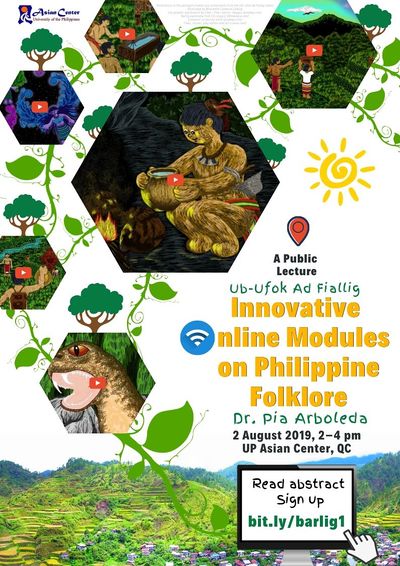Ub-Ufok Ad Fiallig
Innovative Online Modules on Philippine Folklore: A Public Lecture
The UP Asian Center will hold a public lecture, “Ub-Ufok Ad Fiallig: Innovative Online Modules on Philippine Folklore,” at the UP Asian Center, QC on 2 August 2019, 2 pm. The lecture is free and open to the public. Seating is first come, first served. Walk-ins are welcome but participants are encouraged to sign up.
ABOUT THE LECTURE
This paper discusses the significance of orature of the Ifiallig people in Barlig, Mountain Province, the methods used in the tales’ retrieval, the process of reviving them (called ub-ufok) through different media from storybooks to animated films, and the development of innovative online modules.
In an effort to keep Ifiallig orature alive, I conducted a retrieval and translation project of Ifiallig tales. The stories were recorded in situ in the original Finallig language from the mouths of the storytellers themselves. The stories were transcribed, translated and re-narrated into Filipino and English. I produced ten (10) bilingual digital animated films accompanied by online modules entitled Ub-Ufok Ad Fiallig: Tales of Enchantment from Barlig. These modules are designed for Filipino heritage learners at the university level but may be modified to address the needs of other learners. They are available online at no cost to teachers and students.
ABOUT THE IFIALLIG
Barlig is a remote village in Mountain Province, Philippines. The written word did not reach the Ifiallig people until early 20th century. Long ago, in the magnificent mountains of Barlig, the Ifiallig would sit around the fires of the ator (council-house) to listen to tales of their hero-ancestors like Linmipaw and Amfusnun. When work in the payyiw (ricefields) is done, venerable elders and storytellers (umu-ufok) recount these stories in their own language they call Finallig. These stories (ub-ufok), handed down for many generations, serve as a record of their history, genealogy and cultural traditions.
There used to be a time when Barlig’s society revolved around the conversations and agreements forged within the walls of the ator, the seat of government and center of culture. The umu-ufok made sure that a fire was constantly burning, for one vital function of the ator was to provide the source of fire for village households. Today, however, the penetration of external religions, the public school education, the political system imposed by the national government, the introduction of electricity and new technology steadily erode the Ifiallig way of life. More importantly, the passing away of influential village elders, with no one to take over their role, will inevitably extinguish Barlig’s orature, and along with this will vanish the beautiful stories that have given honor and value to the life of a people.
ABOUT THE SPEAKER
Dr. Pia Arboleda is Associate Professor of Filipino and Philippine Literature at the University of Hawai’i at Manoa, where she teaches Translation Theory, Philippine Folklore, Riza’s Life and Writings, and Philippine History and Culture. She was a recipient the 2015 University of Hawaii Regent's Medal for Excellence in Teaching. She is a producer of multimedia learning resources with bilingual content on folklore and indigenous culture. Dr. Arboleda holds a Doctor of Arts in Language and Literature from De La Salle University.
INQUIRIES For queries, please email asiancenter@up.edu.ph.



